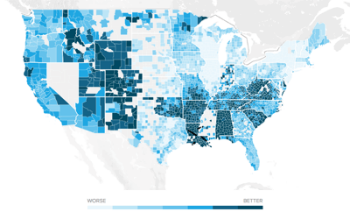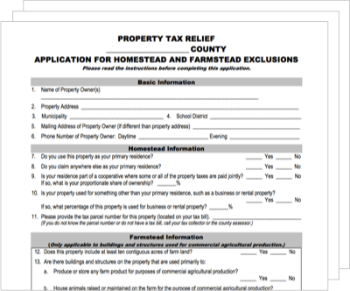In Which States Must Investment Advisers Be Registered?
All Nigh Property Taxes

When you lot purchase a habitation, you'll demand to factor in belongings taxes as an ongoing cost. Subsequently all, yous can rely on receiving a taxation pecker for as long as you ain property. Information technology's an expense that doesn't go away over time and generally increases over the years every bit your home appreciates in value.
What you pay isn't regulated by the federal government. Instead, information technology'south based on state and county tax levies. Therefore, your property revenue enhancement liability depends on where you alive and the value of your property.
In some areas of the state, your annual property tax bill may exist less than one month's mortgage payment. In other places, it tin be every bit high as iii to four times your monthly mortgage costs. With property taxes being so variable and location-dependent, yous'll want to take them into account when you lot're deciding on where to live. Many areas with high property taxes have swell civilities, such as expert schools and public programs, simply you'll demand to have room in your budget for the taxes if y'all desire to live there.
A financial advisor tin help you lot understand how homeownership fits into your overall financial goals. Financial advisors can also help with investing and financial plans, including taxes, retirement, estate planning and more, to make sure you are preparing for the time to come.
What Are Holding Taxes?
Only put, holding taxes are taxes levied on existent estate past governments, typically on the state, canton and local levels. Holding taxes are i of the oldest forms of taxation. In fact, the earliest known record of holding taxes dates dorsum to the 6th century B.C. In the U.S., belongings taxes predate even income taxes. While some states don't levy an income taxation, all states, as well as Washington, D.C., take property taxes.
For state and local governments, holding taxes are necessary to function. They account for most of the acquirement needed to fund infrastructure, public safety and public schools, not to mention the county government itself.

Y'all may have noticed already that the best public schools are typically in municipalities with high home values and high belongings taxes. While some states provide state funds for county projects, other states leave counties to levy and utilise taxes fully at their discretion. For the latter group, this ways funding all county services through property taxes.
To get an idea of where your holding tax money might go, take a look at the breakdown of holding taxes in Avondale, Arizona.
You can run into that Maricopa County takes a cut, as do local school districts and colleges, the library and the burn department. While this shows a specific example, you may not find the same breakup of tax levies where yous alive. Your property tax bill oft depends on county budgets, school district upkeep votes and other variable factors that are singled-out to where y'all own property.
How Do Holding Taxes Work?
Permit's define a couple of key terms before we get into the details of how property taxes work. First, you must become familiar with the "assessment ratio." The assessment ratio is the ratio of the habitation value equally adamant past an official appraisement (normally completed by a county assessor) and the value as determined past the marketplace. And so if the assessed value of your dwelling is $200,000, just the market value is $250,000, and so the assessment ratio is 80% (200,000/250,000). The market value of your home multiplied by the assessment ratio in your expanse equals the assessed value of your property for tax purposes.
Wondering how the county assessor appraises your holding? Again, this will depend on your county's practices, only it'south mutual for appraisals to occur in one case a twelvemonth, once every five years or somewhere in between. The process can sometimes become complicated. In a few states, your assessed value is equal to the electric current market rate of your domicile. The assessor determines this by comparison recent sales of homes like to yours. In other states, your assessed value is thousands less than the market value. Most every county regime explains how holding taxes work within its boundaries, and yous can find more data either in person or via your local government's website.
Some other crucial term to understand is millage rates. The millage rate is the amount per $1,000 of assessed value that's levied in taxes. Millage rates are expressed in tenths of a penny, meaning one mill is $0.001. For example, on a $300,000 home, a millage rate of $0.003 will equal $900 in taxes owed ($0.003 x $300,000 assessed value = $900).
To put information technology all together, accept your assessed value and subtract any applicative exemptions for which you're eligible and y'all become the taxable value of your property.
That taxable value then gets multiplied by the sum of all applicable millage rates. As you can see in the Avondale example in a higher place, each school district has its own millage rate. All the dissever tax levies are added then applied to your taxable value. The number you summate (millage multiplied by taxable value) tells yous the holding taxes owed before whatever credits. Annotation that revenue enhancement credits are different from exemptions and aren't universally bachelor. You'll have to check with your county to see if you're eligible for whatsoever.
These credits are subtracted from whatever taxes you might owe. Once you find that number, y'all have your total property tax bill.
How you lot pay your belongings taxes varies from place to place. Some people pay extra each month to their mortgage lender. The lender keeps that coin in escrow so pays the government on behalf of the homeowner. Other people pay their property taxation neb directly to the canton government on a monthly, quarterly, semi-annual or annual basis. Your payment schedule will depend on how your county collects taxes.
What Are Holding Tax Exemptions?
Here'due south a breakdown of some of the nigh common holding taxation exemptions:
- Homestead
- Persons with disabilities
- Senior Citizens
- Veterans/Disabled Veterans
Well-nigh states and counties include certain property taxation exemptions across the full exemptions granted to religious or nonprofit groups. These specialized exemptions are usually a reduction of up to l% of taxable value. All the same, rates can vary past location.

Some states offer exemptions structured as an automated reduction without whatsoever participation by the homeowner if your property is your primary residence. Other states and counties require applications and proof for specific exemptions such as a homeowner who's a disabled veteran.
Allow's look at an example with regard to the homestead exemption, which safeguards the surviving spouse and protects the value of a home from belongings taxes and creditors in the event a homeowner dies.
Say your country offers a homestead exemption for a homeowner's main residence that offers a 50% reduction of the dwelling'southward taxable value.
This means that if your home was assessed at $150,000, and you qualified for an exemption of l%, your taxable home value would get $75,000. The millage rates would apply to that reduced number, rather than the total assessed value.
It's worth spending some time researching whether you qualify for any applicable exemptions in your area. If you do, you can save thousands over the years.
Property Taxes by Country
Overall, homeowners pay the most property taxes in New Jersey, which has some of the highest effective tax rates in the country. The country's average constructive rate is two.42% of a dwelling's value, compared to the national average of 1.07%.
With an average effective charge per unit of 0.28%, the least expensive state for property taxes is Hawaii, surprisingly. Despite its reputation equally a plush place to live, Hawaii has generous homeowners exemptions for master residents that lower taxable values considerably. The tax break mostly helps those who alive in Hawaii full-time, rather than those who own a 2nd dwelling there.
Also of note are Colorado and Oregon's belongings tax laws, which voters put in place to limit large taxable value increases. Many states don't accept caps on how much property taxes tin can change annually, just those two are examples of state governments that put laws in identify because of taxpayer concern.
Lesser Line
When you're deciding where you desire to purchase a home, property taxes need to play a role in your deliberations. The amount of variance across canton lines and school districts can be substantial. Unlike mortgage payments, belongings taxes never go away. Y'all may be able to get a holding tax break when yous're a senior, merely you should plan on having holding taxes equally a permanent role of your upkeep before you lot take the leap into homeownership.
Source: https://smartasset.com/taxes/property-taxes
Posted by: wattsagron1970.blogspot.com


0 Response to "In Which States Must Investment Advisers Be Registered?"
Post a Comment